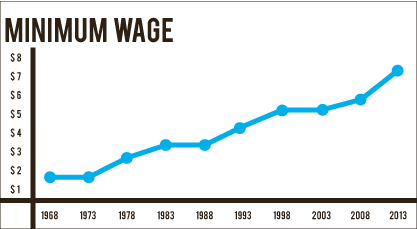The proposed increase, the first since 2009, would be harmful to low-income employees and the economy
Do you like the idea of a 20-percent pay increase? In his State of the Union address, President Barack Obama suggested increasing the federal minimum wage from $7.25 to $9.00 an hour.

Bottom line — The level of minimum wage has started increasing more rapidly in recent years, and President Obama is fighting to raise it further. Photo credit: Elliot Mosher
Most college students, myself included, have worked or are working minimum wage jobs.
I can say that I would absolutely love to get paid an extra $2 to $3 an hour.
At face value, it seems like an extremely good idea that would be beneficial to many lower-income workers, including college students. Despite its appearance as a useful policy change, drastic increase in the minimum wage would actually be harmful to both the economy as a whole and to lower-income workers.
To be clear, having a minimum wage is important — it sets a necessary baseline pay that protects workers and makes sure that they are adequately compensated. However, to drastically increase it like Obama and other Democrats, including Sen. Tom Harkin and Rep. George Miller, are suggesting is the wrong approach and will not be effective.
Harkin and Miller have taken an even stronger stance than Obama.
“We have been working together again this year on our own new legislative proposal to raise the minimum wage to $10.10,” Harkin and Miller said in a joint press release.
Companies that employ workers at or close to minimum wage include retailers, grocery stores and restaurants. About 18 million workers would see pay increases to $9 an hour, according to the Economic Policy Institute. Most of those increases would not be the full $1.75 amount, as, according to the United States Bureau of Labor Statistics, only 3.8 million workers were paid either at or below the federal mandate.
Minimum wage workers will not be the only people getting raises. Any increase will have a proportionate effect throughout the workforce. If a manager is getting paid $11 an hour and the minimum wage for entry-level positions goes up to $10, the manager will likely receive a pay raise. In order to maintain a fair pay scale, everyone up the line would also receive pay increases.
A rise in wages seems good for workers until the other effects are considered. If the minimum wage is increased, the money has to come from somewhere.
Companies have two options in response to the extra costs of a minimum wage increase. In order to maintain their profits, they can either cut costs or increase revenue. Both of these options would be harmful to the economy.
Cutting costs probably means either firing workers, or not hiring as many new employees. Either way, it means fewer jobs.
David Neumark, University of California at Irvine economist, explained to the Wall Street Journal that out of 100 major studies on the minimum wage, 85 percent of them “find a negative employment effect on low-skilled workers.”
The other option companies have is to increase revenue, which means that they will have to increase the price on their goods and services.
Companies in almost every area of the economy have minimum wage employees, which means that the cost of most basic services will go up. Everything from food to clothing to basic items that people buy at Walmart have a decent chance of costing more as those companies try to maintain their profits.
“Prices unambiguously increase in response to a minimum wage change,” research in 2008 by the Journal of Human Resources concluded.
The only winner in the minimum wage increase is the politicians who are able to play it off as doing something good for the people. It is nothing other than a public relations move to win votes.
Regardless of the response to minimum wage increases, it is not a policy that will help the poor or the economy. It is not possible to legislate people out of poverty. If someone wants to make more than minimum wage, then they need to learn a skillset that will get them into a better situation.
It is unfortunate, but unless we want to have a communistic society where everyone gets paid exactly the same amount, there will be people who get paid more than others.
The people who are paid less are those who do the work that pretty much everyone is physically capable of doing. Wages are paid in proportion to the rarity of someone’s skill. That is why Tom Brady makes millions and Joe the Walmart cashier does not. That is why doctors make more than people flipping hamburgers.
The result of the proposed minimum wage increase is that wages overall will be higher, but at the cost of losing jobs and an inflation that will negate any benefit of increased wages. It is a pointless proposal designed by Democrats to win votes, not bolster the economy. A better, but less exciting, alternative would be to raise the minimum wage constantly to match inflation, but to do it very gradually so as to not negatively affect the economy.